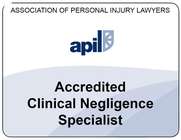medical negligence
Brain tumour and medical negligence: Can you make a claim?

Being diagnosed with a brain tumour can be a worrying time.
Control of your daily life can disappear and become replaced by feeling anxious, uncertain and overwhelmed. We understand you may be worried and concerned about your future and how to provide for your family. Our specialist team have many years of experience and knowledge to help and support you.
- Brain Cancer: medical negligence claim
- Detection and diagnosis of brain tumours?
- What is a brain tumour?
- What are the symptoms of a brain tumour?
- What is the treatment for a brain tumour?
- What is the prognosis for a brain tumour?
- Mission to revolutionise brain tumour research
- Disclaimer
Brain cancer: medical negligence claim
With timely diagnosis and appropriate treatment, many brain tumours are treatable, controllable, and sometimes curable. However, left undiagnosed and untreated, many tumours will grow and can cause serious life-changing problems, or even death.
If you suspect that there has been a delay in diagnosing the tumour, there may be a claim for medical negligence.
Why Choose Tees
Our expert solicitors understand the devastating impact of delayed treatment. We can help you get financial compensation, an explanation and/or an apology. We make the legal process as stress-free as possible and offer Non Win, No Fee Agreements, so that if your claim is unsuccessful, you will not be responsible for any fees or costs.
Tees has a proven track record of securing substantial compensation for clients who have suffered due to a delayed diagnosis of brain tumours.
Most recently, Janine Collier and Megan Reckless settled a case involving a delayed diagnosis of a brain tumour and consequent sight loss for £1,010,793.53. The claim concerned a failure to investigate a visual field defect and a persisting failure thereafter to investigate ongoing visual complaints. A Personal Injury Trust has been set up through Tees’ private client Team, and the client is now seeking investment advice through Tees Wealth.
"Janine is an extremely good and competent partner, solicitor and negotiator. She kept me updated throughout my claim and also contacted me at various points to make sure I understood what was happening with the claim and was ok. Janine assembled a great team of experts and continually challenged them – and the defendant on the evidence they presented. Janine and the KC did a great job negotiating a settlement against the defendant – and I was happy I got the settlement I was looking for. I’d highly recommend Janine to anyone looking for a medical negligence lawyer – I’d be surprised if you’d find a better one!“ Mrs B, client
Read how our medical negligence experts helped pursue a claim in the following case: Widow secured a six figure sum after 5 year delay in diagnosing her husband’s brain tumour.
Let us help you to take the next steps.
Janine Collier, a Partner and specialist in brain cancer cases in the Medical Negligence team at Tees, explains how they should be diagnosed, plus the causes and symptoms of brain cancer.
Detection and diagnosis of brain tumours?
Sometimes, brain tumours may be identified during a brain scan. Usually, however, a patient will first present to a GP or Accident & Emergency and will then be referred to a neurologist for further investigation.
At the appointment with the neurologist, the assessment may include:
- a neurological examination, eye and hearing tests - these tests help determine if a tumour is affecting how the brain functions. An eye examination can detect changes to the optic nerve, as well as changes to a person’s field of vision.
- neurocognitive tests - these are a detailed assessment of all major functions of the brain, such as storage and retrieval of memory, expressive and receptive language abilities, calculation, dexterity, and the overall well-being of the patient.
- blood tests
- a brain scan - MRI scans can measure the tumour’s size, CT scans can also help find bleeding and enlargement of the fluid-filled spaces in the brain, called ventricles and changes to bone in the skull. PET scans can help to show up a brain tumour by highlighting the areas of the brain where cells are more active than others.
- a biopsy is where a small tissue sample is taken for laboratory testing to confirm the type and grade of the tumour. This helps the doctors decide the best treatment for you.
If you think you've suffered a delay in diagnosis, talk to us today
What is a brain tumour?
When cells grow or spread abnormally and multiply uncontrollably in the brain, a brain tumour forms. A primary brain tumour starts in the brain. A metastatic brain tumour originated in another part of the body, such as the breast, lung or bowels and spread to the brain, usually through the blood stream.
A tumour can be:
- Cancerous (malignant)
- Non-cancerous (benign)
Low-grade tumours (Grades 1 and 2) are usually slower-growing and not immediately life-threatening. High-grade tumours (Grades 3 and 4) or malignant brain cancers are usually faster growing, aggressive and can be a serious threat to life.
Some of the more common benign brain tumours in adults include:
- Meningiomas
- Schwannomas, e.g. acoustic neuroma
- Pituitary adenoma
- Craniopharyngiomas
- Medulloblastoma.
Malignant brain tumours include gliomas such as:
- Astrocytomas
- Ependymomas
- Glioblastomas (GBM)
- Medulloblastomas
- Oligodendrogliomas.
Brain tumours can occur in both adults and children. Age, exposure to radiation, a family history and some genetic conditions are known to increase the risk of getting a brain tumour.
What are the symptoms of a brain tumour?
The symptoms of a brain tumour depend on which part of the brain is affected and how large the tumour is. They can often resemble the symptoms of other illnesses.
Warning signs to be aware of include:
- frequent, severe headaches
- ringing in the ears (tinnitus)
- seizures (fits), twitching of the face or limbs or temporary ‘absence seizures’ where you lose awareness of your surroundings for a short time
- nausea and vomiting
- mental changes such as confusion, memory problems, loss of concentration
- personality or behavioral changes
- problems with vision such as blurred or double vision, loss of peripheral vision or blind spots
- problems with speech
- progressive weakness, numbness, loss of balance lack of co-ordination
- fatigue
- hormonal fluctuations.
What is the treatment for a brain tumour?
Treatment options for primary brain tumours will depend on:
- the type of tumour
- the size and location of the tumour
- tumour grade
- rate of tumour progression
- other patient factors, such as the age and health of the patient and the patient’s preferences
Treatment may include:
- steroids and medicines to provide symptomatic relief
- “watch and wait” monitoring
- radiotherapy
- chemotherapy
- surgery (craniotomy)
- genomic biomarker-based treatments, a personalised cancer therapy, whereby through molecular profiling, patients receive targeted treatments.
If surgery is performed it may not be possible to remove the whole brain tumour and treatment with radiotherapy or chemotherapy may also be needed to treat any abnormal cells left behind.
Usually treatment options are discussed at a Multi-Disciplinary Team (MDT) Meeting where clinicians such as neurologists, neuro-oncologists and neurosurgeons and agree the best way forward for the patient.
What is the prognosis for a brain tumour?
Many people with a brain tumour live long, healthy and happy lives if the tumour is caught and treated early. That is why diagnosing and treating the tumour promptly is so important – it can make an enormous difference to the outcome.
Every brain tumour is different – the higher the grade and the larger and more advanced the tumour, the more likely it is that there will be life-long and, life-changing impacts. These usually include physical and emotional difficulties, but as well as these there are often social and financial effects from the tumour itself and/or its treatment.
Mission to revolutionize brain tumour research
Like the treatment for many forms of cancer, brain tumours are the subject of much research across the world by many teams of scientists. The whole of medicine is benefitting from radical new approaches such as those provided by genetic research. Here in the UK, in January 2018, just 5 months before she died, the politician, Baroness Tessa Jowell bravely stood up in the House of Lords and called for more funding and support for people with brain tumours. “For what would every cancer patient want?” she asked. “To know that the best, the latest science was being used – wherever in the world it was developed, whoever began it.”
Find out more about brain tumour research Cancer Research UK
Related content - Brain tumour charity - What do we know about NHS waiting times
Disclaimer
All content is provided for general information only, and should not be treated as a substitute for the medical advice of your own doctor, any other health care professional or for the legal advice of your own lawyer. Tees is not responsible or liable for any diagnosis made by a user based on the content of this site. Tees is not liable for the contents of any external internet sites listed, nor does it endorse any service mentioned or advised on any of the sites. Always consult your own GP if you're in any way concerned about your health and your lawyer for legal advice.
Call for a FREE initial consultation on 0800 013 1165
Tees is here to help
We have many specialist lawyers who are based in:
Cambridgeshire: Cambridge
Essex: Brentwood, Chelmsford, and Saffron Walden
Hertfordshire: Bishop's Stortford and Royston
But we can help you wherever you are in England and Wales.
Chat to the Author, Janine Collier
Executive Partner, Medical Negligence, Cambridge office
Meet Janine
- Areas of expertise
- Accreditations
- Testimonials
Legal 500 UK 2025
East Anglia
Janine Collier - one of the outstanding practitioners in the country. Not only excellent on all her own cases but ensures the standards of the whole team are extremely high.
Legal 500 UK 2025
East Anglia
Janine Collier is an excellent solicitor and runs a very dedicated and efficient team.
Legal 500 UK 2025
East Anglia
Janine Collier is exceptional for her detailed factual and legal analysis of claims, the high standard of her instructions, and her sensitive client management. Her energy is remarkable.
Legal 500 UK 2025
East Anglia
Janine Collier is an extremely able and committed lawyer; apart from her skill as a litigator and negotiator, Janine is known for going the extra mile for her clients. Janine's tenacity is evident from the excellent case outcomes she achieves; even in the most complex of cases, she is unafraid to litigate if the right settlement cannot be achieved, but her negotiating skills are such that she sees the benefits of settlement where the award is at an appropriate level as this provides certainty that does not follow litigation.
Legal 500 UK 2025
East Anglia
'Janine Collier inspired confidence and put us at ease. Janine always showed great empathy, and we felt we weren't treated simply as a case but as individuals. She was in regular contact by phone/email - even out of hours when required. She built a great team of experts for our case - and regularly questioned and challenged them. She also found us a good case manager, who found us experts who could really help us - and she negotiated an advance on our settlement to fund these.
Anonymous
Cambridge
Janine was extremely compassionate and caring about my experiences. Her words have remained dear to my heart and kept me strong throughout this process. She is a remarkable lady who truly wanted the best outcome for me. Anytime I contacted her, she always explained everything thoroughly and in detail. My queries were always resolved in her presence. She has a very good heart.
Legal 500 UK 2024
East Anglia
Janine Collier is a stand-out. She would be coveted by all top firms. An excellent leader, an excellent litigator.
Legal 500 UK 2024
East Anglia
Janine Collier has been brilliant throughout our whole process, and I have felt extremely supported and able to trust that she has my son’s best interests in mind with everything she does.
Legal 500 UK 2024
East Anglia
Janine Collier is hugely able and extremely hard-working – a perfect leader of the team as well as a fantastic litigator.
Legal 500 UK 2023
'Janine Collier has an amazing reputation and quite rightly, she very quickly spotted something that wasn’t the main focus of the case but is able to zoom out and look at everything that’s going on and spot things others wouldn’t spot. You can tell she really cares and is a very dedicated person who just wants to help. The team are all caring and efficient'
A
Cambridge
'A heartfelt thank you for all you have done in preparation for and during the settlement meeting, as well as for your unfailing support along the way, in and out of hours. It is undoubtedly due to your high professionalism if the outcome today has exceeded all expectations; it will be a huge help for us going forward and we will be forever grateful'
Chambers & Partners 2022
Cambridge
'Janine Collier is renowned for her handling of delay in diagnosis, obstetric injury and surgical negligence claims. She is at the top of her game and knows clinical negligence inside and out'
Susan Hickman
Cambridge
'We consider ourselves fortunate to have been recommended to Tees by the solicitor we initially approached. We did not realise it until the case was well established that the level of professional care we were receiving was exceptional and that the experience of the individuals and the contacts they have to assist in a very complex case was the best available. We are grateful that we received a satisfactory settlement as a result of their efforts under difficult circumstances and dealing with defendants that were obstructive and disorganised. By far the greatest benefit for us however is the fact that the victim, with assistance from highly skilled experts that we would not have known about otherwise, learned to walk short distances when all other medical opinion did not consider this possible. This was their greatest achievement which is well beyond the service we expected'
The Fisher family
Janine works with empathy, understanding and compassion. She handled our mother's inquest with skill and sensitivity and guided us expertly. She kept us informed continually via email and multiple meetings and phone calls. Janine completely took the sting and the stress out of our case.







